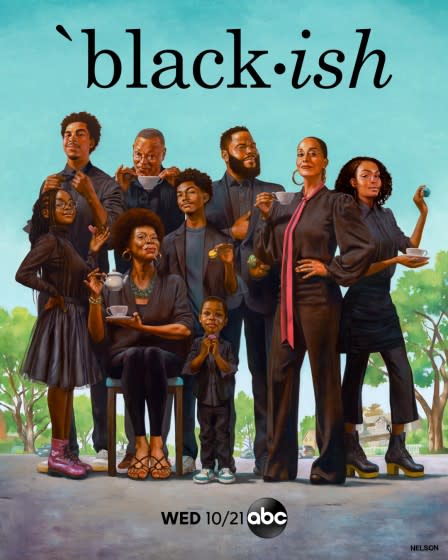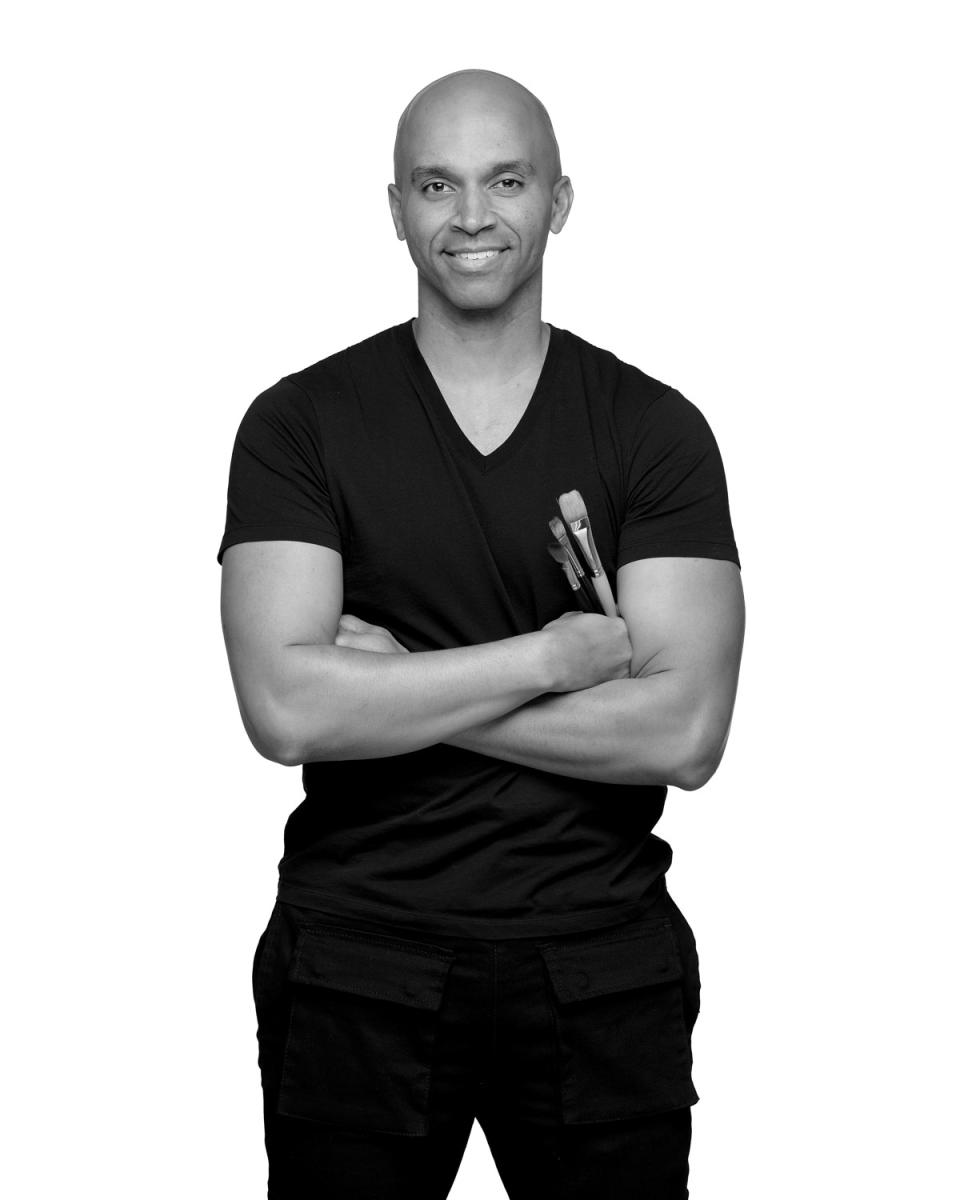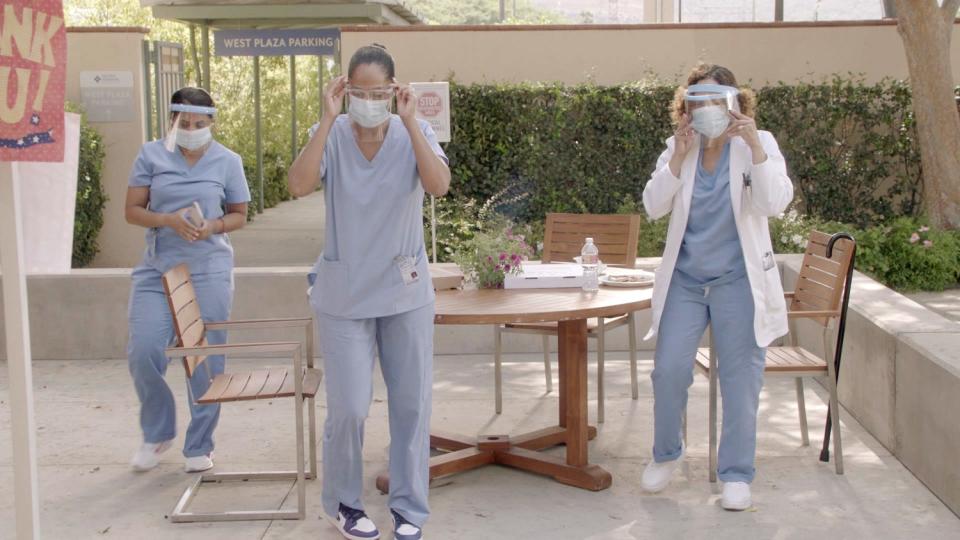Kadir Nelson is the 'artist of the moment.' Get ready to see his new work all over L.A.
- Oops!Something went wrong.Please try again later.

Chances are you know the work of Kadir Nelson, even if you don’t know his name.
If you ever used a Marvin Gaye commemorative postage stamp, for instance. Or saw the June 22 cover of the New Yorker, titled “Say Their Names,” which paid tribute to George Floyd and other victims of police brutality. Or listened to Drake’s album “Nothing Was the Same.” Or read one of the 30 children’s books he has illustrated, among them the 2020 Caldecott winner “The Undefeated,” an ode to the endurance of Black Americans written by poet Kwame Alexander.
Nelson’s artwork is renowned for its portrayals of cultural heroes. His stark portrait of the young Nelson Mandela, fist raised, graced the cover of the New Yorker in 2013 after Mandela’s death at age 95. His picture book “We Are the Ship: The Story of Negro League Baseball” was a New York Times bestseller.
“My goal is to really tell the human story,” says the L.A.-based artist. “To create artwork that inspires the better part of ourselves. To inspire us to become heroes in our own stories. Both individually and collectively.”
This month Nelson, 46, is about to go big with a portrait of the cast of the ABC series “black-ish,” whose seventh season premieres Oct. 21. With placement on billboards around L.A. — Hollywood and Highland, Sunset Boulevard and West 3rd Street — the art will receive maximum exposure.
“Anywhere there are going to be a lot of eyes is the best place,” he says.

The portrait, “Black-ish Tea,” depicts the stylishly dressed Johnson family on the street sipping tea out of china cups and eating macarons against a bright blue sky. Their bemused expressions invite you to wonder what they’re all thinking and talking about. For Nelson, a graduate of New York’s Pratt Institute, they’re having the national conversation — as in, “What is happening to the world?”
For his part, the idea lent political relevance to previous key art treatments that showed the Johnsons enjoying a family activity like “riding bikes or playing Jenga,” Nelson says. “I looked at … what people were doing during COVID and I found a list that had the theme of a tea party. And I thought that’s pretty much what the Johnson family would be doing. They would have something to say about this crazy, roller-coaster year we’ve been experiencing and pretty much have this knowing look. Like, ‘We know better about what’s going on, but we’re just going to sip our tea.’”
Nelson was approached to do the portrait by the network’s marketing department, which was suitably impressed by his powerful 2020 New Yorker covers, which also include “Distant Summer,” the portrait of a lonesome Black boy holding a red, white and blue popsicle, and his cover for July’s Rolling Stone, “America Uprising.”
For executive producer and showrunner Courtney Lilly, the show lucked out in securing the artist's services. “Kadir is the right artist of the moment,” he says. “It was beyond what we asked for.”
Working under a tight deadline — Nelson won’t say how long it took him to complete the painting — he first scheduled individual photo shoots with cast members and then sketched their portraits on a 70-inch-square linen canvas, arranging the nine figures in a close grouping.
“I wanted to quarantine them in this kind of bubble, but in their neighborhood,” he explains. “I wanted to do something different than what had been done in [the key art of] previous seasons. Most of them had very dark backgrounds. I thought, ‘Let’s put them outside but give them a signature look. Something different but still very colorful and bright.’”
He kept the cast in the dark about the theme of the painting, though. “I would ask them to act like they were holding a cookie or a cup of tea,” he says. “I told them to imagine what the Johnson family would be doing at Buckingham Palace or a fancy party. It was all a big mystery, so by the time the final painting was revealed to them it was a great surprise.”
“Black-ish Tea” captures the emotions of the Johnson family, from Pops’ (Laurence Fishburne) ironic detachment to Dre’s (Anthony Anderson) skeptical, furrowed brow to Bow’s (Tracee Ellis Ross) proudly raised head — diverse reactions to a global crisis whose dimensions remain a mystery.
Series creator and executive producer Kenya Barris says, “Kadir captures everyone like he went inside them, and I love that about him. He draws a really fine line between caricature and a character’s signature. And I feel that’s [what] our show has become. It’s big, it’s bold and it’s overexaggerated. And it’s proud.”
Barris worked with Nelson before, on the controversial 2018 episode “Please, Baby, Please,” which is also the title of a 2007 children’s book written by Spike Lee and his wife, Tonya Lewis Lee, and illustrated by Nelson. The episode referred to President Trump as America's "shady king," and was shelved by the network because of “creative differences.” (It recently aired on Hulu.) Nelson supplied the Shady King image, which was animated for the episode. “It’s him sitting on his throne, sort of watching the land before him fall apart,” says Barris.

In this spirit, he adds, the new portrait fits with the series’ politically themed episodes “like a glove. It’s bold and unapologetic.”
Lilly says “black-ish” will be addressing changes in the world this season, notably what it’s like for the Johnsons to home-school their kids and Bow’s experience as a first responder/essential worker.
“Whatever people are talking about, these characters will be talking about,” Lilly says.
Nelson hopes his portrait provokes conversation.
“When I look at the painting, I see the humor in it but I also see the seriousness in it because it’s addressing what’s going on in the world and how we respond to it,” he says. “It’s important that we have our own opinions. And are inspired to take action on those opinions. The time is very pressing right now not to sit back and do nothing.”
This story originally appeared in Los Angeles Times.

